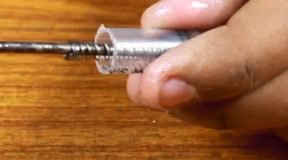Franklin motor
Materials
two aluminum cans,plastic cup, snap, pushpin, polystyrene foam board, styrene foam pillar,
aluminum foil, paper clip, adhesive tape, vinyl pipe, and kitchen paper
Construction
- A hole is made at the center of the bottom of a plastic cup. Put the snap in the cup to make a bearing.
- Eight pieces of aluminum foils are cut into 10×25mm pieces. Put them on the cup.
- The pushpin is put on the tip of the styrene foam pillar. The pillar is bonded to the styrene foam board.
- The paper clip is put on two aluminum cans by aluminum foil. The point of the clip makes it go out by 40-50mm.

How Simple Electrostatic Franklin's Motor WORKS:
When a high voltage is applied between the two stator cup foils, one stator cup aquires a negative charge imbalance, while the other one becomes positive. Also, a tiny spark jumps from the tip of each commutator brush to one of the foil sectors on the rotor bottle. The sector under the positive brush becomes positive, the one under the negative brush becomes negative. The rotor's foil sectors are then repelled from the alike-charged stator bottle and attracted to the unlike charged stator cup. This sideways electrostatic force causes the center bottle to rotate, which brings new foil sectors under the brushes. Tiny sparks then jump to the new sectors and charge them, which makes them attract/repel from the stator bottles, etc. The foil on the rotor bottle that's under the commutator is always charged the same as the commutator, so it's always being repelled/attracted sideways. The force is continuous, therefor the speed of the rotor cup will keep rising higher and higher. In practice the rotor speed will not increase forever, but will stabilize because of air turbulence, bearing resistance and bearing chatter, etc. If the entire motor could be put inside a vacuum chamber, it would REALLY run fast. But then the sparks couldn't jump from the commutator wires, and you'd have to arrange some kind of sliding contact brushes instead. (Sparks cannot exist in vacuum, since a spark is made of air which has turned into plasma.) (Reference http://amasci.com/emotor/emot1.html)
Watch Video
See Also:
Make a Simple DC motor with easy and Step by Step instructions
Electromagnetism, Experiment 2 Liner motor
Make your own very simple Clip motor "DC Motor"







